The Government has made progress with ‘putting right’ the wrongs made with the 2004 GP contract, health secretary Jeremy Hunt has said.
Addressing MPs in the House of Commons in an opposition day debate on NHS and social care funding today, Mr Hunt spoke about ‘the need to make sure that if we want alternatives to A&E people are indeed able to get to see their GP’.
He claimed he has ‘said many times that people wait too long to see their GPs’, adding that: ‘I have to say in all honesty that I think the GP contract changes in 2004 were a disaster because the result of those changes were that 90% of GPs opted out of out-of-hours care.’
He added: ‘But we have been putting that right, and now 17m people in England – around 30% of the population – have access to weekend and evening GP appointments.’
His comments come on the same day as the National Audit Office published a report into the seven-day GP access scheme which claimed it was costing 50% more than in-hours GP care and GP leaders saying the scheme was ‘in disarray’.
The Labour Party’s opposition day motion called for ‘the Government to bring forward extra funding now for social care to help hospitals cope this winter, and to pledge a new improved funding settlement for the NHS and social care in the March 2017 Budget’.
The health secretary has previously said the 2004 GMS contract was to blame for the subsequent lack of investment in general practice.
Earlier this week, Mr Hunt also said he expected GPs to step in to help reduce pressures in urgent care.
Addressing Parliament, he said measures to relieve A&E pressures may include ‘releasing time for GPs to support urgent care work’.
The Department of Health indicated in a tweet, which was later deleted, that this would include the QOF reporting period being ‘extended until April’.
However, asked by Pulse, the DH said yesterday that there are no immediate plans on how to free up GPs’ time.
GPC deputy chair Dr Richard Vautrey said the DH tweet was ‘made in error’, adding: ‘We made it clear that extending the reporting time for QOF would not help practices but could make things worse for them as it would delay essential payments that practices are dependent on to pay their staff.’
‘Practices are under massive workload pressures and as our surveys have repeatedly highlighted GPs are already worried about the impact that workload and workforce problems are having on the quality of care they can give to their patients and have little or no capacity to do more.
‘The focus of NHS managers is currently on hospitals but if anything it’s GP practices that need additional support to help them manage workload pressures to deliver a safe service,’ he said.
Pulse October survey
Take our July 2025 survey to potentially win £1.000 worth of tokens












